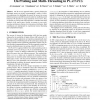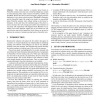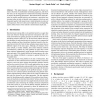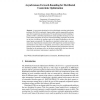ECAI
2006
Springer
15 years 4 months ago
2006
Springer
The PLATYPUS approach offers a generic platform for distributed answer set solving, accommodating a variety of different architectures for distributing the search for answer sets a...
ECAI
2006
Springer
15 years 4 months ago
2006
Springer
Minimally unsatisfiable subformulas (in short, MUSes) represent the smallest explanations for the inconsistency of SAT instances in terms of the number of involved clauses. Extract...
102
click to vote
ECAI
2006
Springer
15 years 4 months ago
2006
Springer
Abstract. We address the problem of extracting Minimal Unsatisfiable Cores (MUCs) from constraint networks. This computationally hard problem has a practical interest in many appli...
ECAI
2006
Springer
15 years 4 months ago
2006
Springer
Abstract. Alternating-offers is the most prominent negotiation protocol for automatic bilateral bargaining. Nevertheless, in most settings it is still not known how two fully ratio...
112
click to vote
ECAI
2006
Springer
15 years 4 months ago
2006
Springer
Semantic matching determines the mappings between the nodes of two graphs (e.g., ontologies) by computing logical relations (e.g., subsumption) holding among the nodes that corresp...
111
Voted
ECAI
2006
Springer
15 years 4 months ago
2006
Springer
This article describes a semantic parser based on FrameNet semantic roles that uses a broad knowledge base created by interconnecting three major resources: FrameNet, VerbNet and P...
99
Voted
ECAI
2006
Springer
15 years 4 months ago
2006
Springer
Abstract. This paper proposes a novel approach to discover options in the form of conditionally terminating sequences, and shows how they can be integrated into reinforcement learn...
ECAI
2006
Springer
15 years 4 months ago
2006
Springer
In this paper we explore whether an auctioneer/buyer may benefit from introducing his transformability relationships (some goods can be transformed into others at a transformation ...
ECAI
2006
Springer
15 years 4 months ago
2006
Springer
106
Voted
ECAI
2006
Springer
15 years 4 months ago
2006
Springer
A new search algorithm for solving distributed constraint optimization problems (DisCOPs) is presented. Agents assign variables sequentially and propagate their assignments asynchr...




